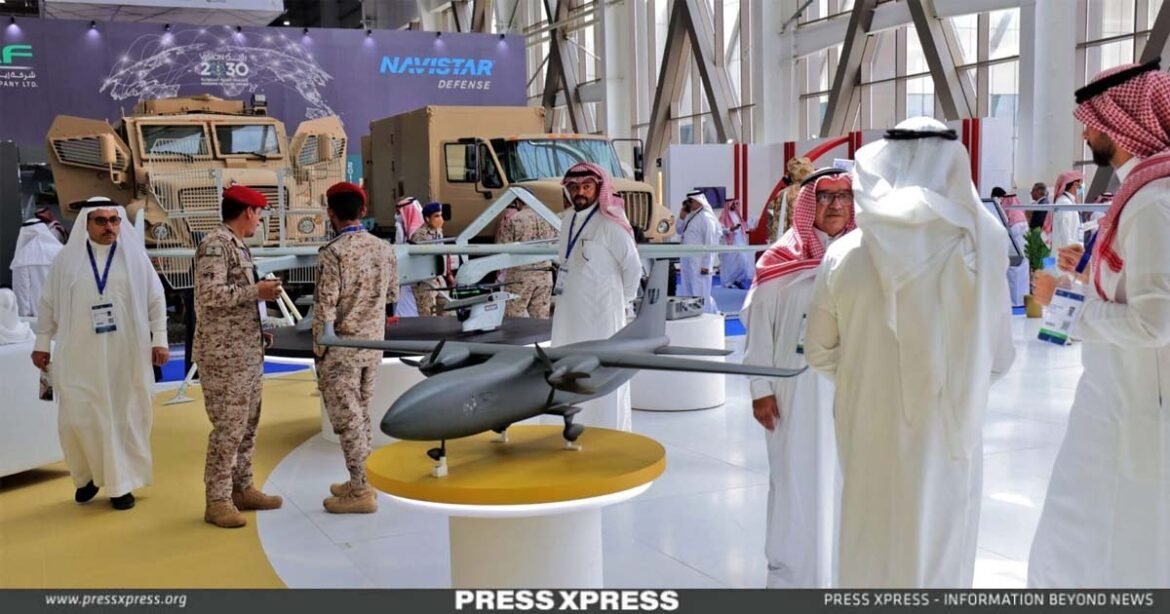“Equipped for Tomorrow” – the theme of ‘World Defense Show 2024’
Amidst growing tensions in the Middle East, Saudi Arabia has recently made significant defense deals, including purchasing Cheongung M-SAM II missile defense systems from South Korea and artillery munitions from India. These agreements were made during the Riyadh Defense Expo. After February 8, 2024, when the event concluded, there are also several orders totaling $6.9 billion (SAR 26 billion) were obtained in Saudi Arabia.
“We are deeply gratified by the global defense community’s keen interest in Saudi Arabia as a major player in the defense industries sector. World Defense Show 2024 has effectively connected industry leaders and innovators from across the globe,”
– Ahmad al-Ohali, CEO, General Authority for Military Industries (GAMI), Saudi Arabia

The Indian defense producer Munitions India Limited (MIL) secured a $225 million contract to supply artillery ammunition to Saudi Arabia, marking its largest known export order.
You can also read: Putin claimed Russia has no interest in wider war
MIL, a subsidiary of the Indian Ministry of Defense, manufactures various types of ammunition, including 155mm artillery shells. These shells, used in howitzer systems, are highly sought after for their ability to strike targets from a safe distance. The United Arab Emirates, Armenia, and potentially Ukraine are among the known customers of these shells.
Additionally, Saudi Arabia has tested Bharat Forge’s Bharat 52 artillery gun and reportedly placed an export order for artillery guns from the Kalyani Group, a major Indian defense manufacturer. The Riyadh defense expo has served as a platform for Saudi Arabia to strengthen defense ties with countries like South Korea, Iran, and China, while also showcasing its capabilities to attract overseas investors. The Saudi Arabian Kingdom aims to localize more than half of its military spending by 2030, providing opportunities for multinational companies to establish a presence in the country.
MIL’s Landmark Saudi Deal
Munitions India Limited (MIL), an Indian defense producer, has secured a significant contract worth $225 million to supply artillery ammunition to the Kingdom of Saudi Arabia. Facilitating this landmark agreement is MIL’s partner, Nadrah Company.
This contract marks the largest known export order for the Indian Ordnance Factory Board or its successor entities. To enhance functional autonomy and efficiency in Ordnance Factories, the Indian government divided them into 7 Defence Public Sector Undertakings comprising 41 Units, effective from October 1, 2021. The UAE procured 40,000 and 50,000 155 mm artillery shells in 2017 and 2019, respectively, totaling approximately $40 million in 2017 and $46 million in 2019.
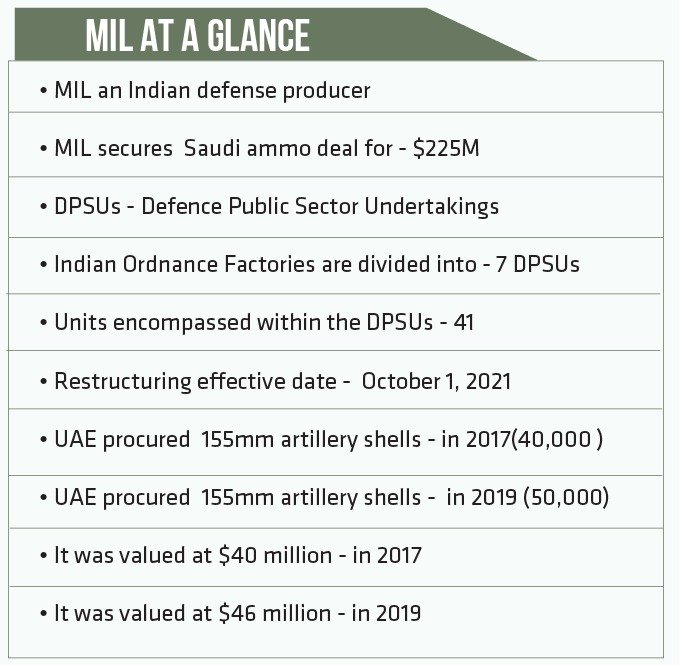
The announcement of the contract was made by MIL on social media. The signing ceremony was graced by H.E. Ahmad Abdulaziz Al-Ohali, Governor of the General Authority of Military Industries, KSA, and Indian Minister of State for Defense Ajay Bhatt.
MIL is a leading manufacturer of various types of ammunition, including 105mm, 125mm, and 155mm artillery shells. In addition to artillery ammunition, the company supplies munitions for various military applications. The 155 mm artillery round consists of four components: detonating fuse, projectile, propellant, and primer. Each round measures 155 mm in diameter, weighs approximately 100 pounds (45 kilograms) and is approximately 2 feet (60 centimeters) long. These rounds are utilized in howitzer systems, which are characterized by their ability to adjust barrel angles for different firing ranges.
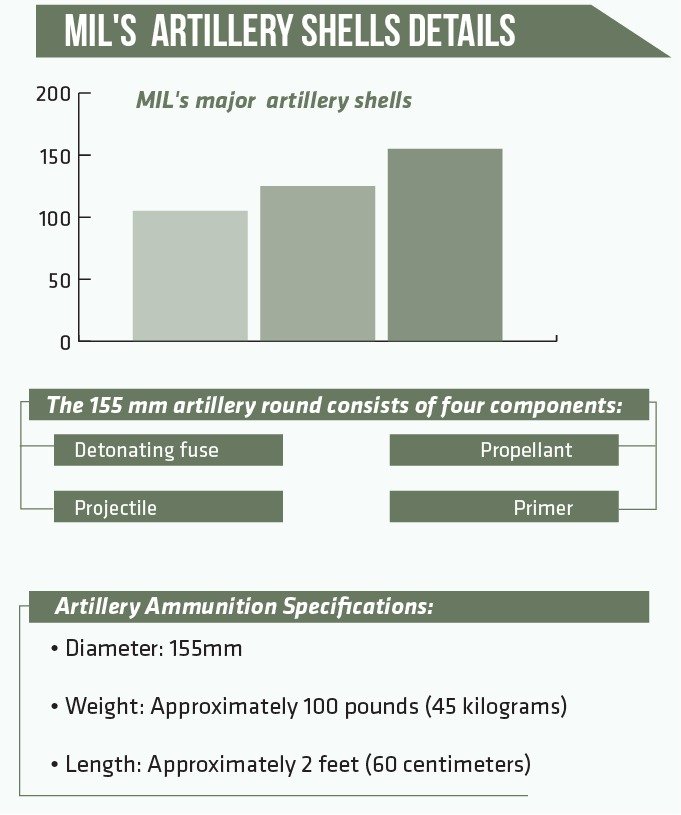
Howitzers are highly valued by ground forces for their ability to engage targets from a safe distance, with ranges of up to 15 to 20 miles (24 to 32 kilometers), depending on the type of ammunition and firing mechanism used. This provides minimal warning to the enemy. Known customers of 155 mm shells include the United Arab Emirates and Armenia. Recently, an unnamed European country, likely Poland or Slovenia, acquired these artillery shells.
Recent videos from Ukraine suggest that Ukrainian forces are using Indian-made artillery ammunition. Reports from Russian and Ukrainian social media indicate that Ukraine may have received Indian 155mm artillery shells, particularly the HE ERFB BT variant manufactured by MIL. The HE ERFB BB variant of the 155mm artillery shell possesses high explosive capability and an operational range of slightly over 38 kilometers. Its user-friendly design allows it to function effectively in temperatures ranging from -20 degrees Celsius to +60 degrees Celsius.
In 2020, Saudi Arabia conducted trials for Bharat Forge’s Bharat 52, a 155 mm, 52 caliber towed howitzer. This was the first artillery gun produced by the defense firm, with a range of about 41 km and a firing capacity of six rounds in 50 seconds.
Subsequently, in 2022, Kalyani Strategic Systems announced securing an export order worth $155 million (over Rs 1,200 crore) for artillery guns from an undisclosed country, designated as a “non-conflict” zone. Later reports suggested that the order was destined for a Middle Eastern nation.
The Kalyani Group offers multiple variants of the 155 mm artillery guns, including the Advanced Towed Artillery Gun (ATAGS), developed in collaboration with the Indian Defence Research and Development Organisation (DRDO). ATAGS boasts enhanced firing range and mobility.
South Korean Firm Secures $3.2B Missile Contract
LIG Nex1, a South Korean defense firm, secured a contract worth US $3.2 billion with the Saudi Defense Ministry to supply its Cheongung M-SAM II missile defense system to the Kingdom. The agreement was finalized after a meeting between the defense ministers of Saudi Arabia and South Korea at the World Defense Show in Riyadh on February 4, 2024, as per the statement from the South Korean Defense Ministry.
The defense exhibition in Riyadh has emerged as a valuable platform for Saudi Arabia to enhance its relationships with South Korea, Iran, and China, with Russia also making a significant presence. In 2024, the Kingdom boosted its military expenditure from 259 billion riyals to 269 billion riyals ($71.72 billion).
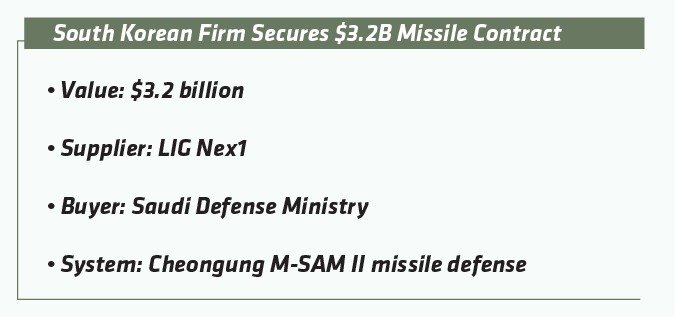
The occasion is seen as an opportunity for the Saudi government to showcase its capabilities to international investors, thereby enabling multinational corporations to explore potential opportunities in one of the world’s fastest-growing economies.
The sector presents numerous advantages for companies seeking to establish a local footprint in the Kingdom, as the government is actively promoting local development, aiming to employ millions of young Saudis and fulfill its substantial defense requirements. By 2030, it aims to localize more than half of its military spending.
Saudi Arabia’s World Defense Show
The second edition of the World Defense Show took place from February 4th to 8th, 2024, in Riyadh, Saudi Arabia, spotlighting cutting-edge advancements in defense and security technologies. This year’s theme, “Equipped for Tomorrow,” showcased a diverse array of programs such as the International Women in Defense Program, Future Talent Program, and Defense Space Arena. The forthcoming edition of the exhibition is slated for 2026.
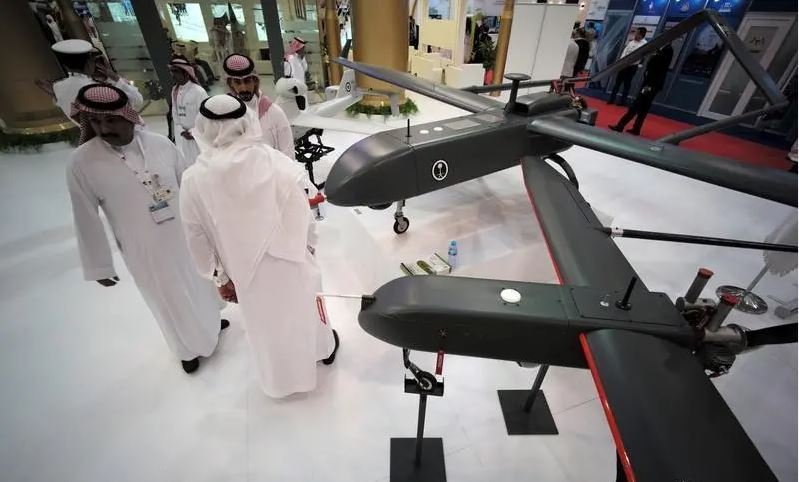
Following the conclusion of the event on February 8th, 2024, numerous orders amounting to $6.9 billion (SAR 26 billion) were secured in Saudi Arabia.
Although specific details of many agreements were not disclosed publicly, the cumulative value approached the previous year’s inaugural defense show, which saw nearly $8 billion in orders and agreements.
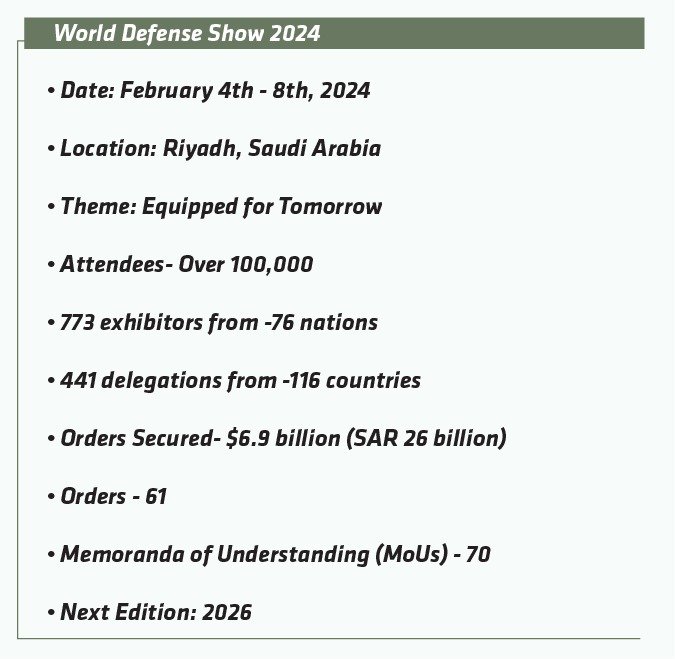
The international arms and security exposition spanned five days, drawing over 100,000 attendees and hosting 773 exhibitors from 76 nations. This encompassed 441 delegations from 116 countries. Anticipating a turnout of 100,000 visitors, the CEO of the defense show expressed satisfaction with the achieved attendance in an interview with Al Arabiya English earlier in the week.
Moreover, alongside 61 orders, 70 Memoranda of Understanding (MoUs) were formalized during the event. Dignitaries from Saudi Arabia, including Defense Minister Prince Khalid bin Salman and Riyadh’s ambassador to the US, Princess Reema bint Bandar, were prominently observed at the exhibition.
In conclusion, amidst heightened tensions in the Middle East, Saudi Arabia’s recent defense agreements signal strategic shifts in its military procurement, notably with acquisitions from South Korea and India. The Riyadh Defense Expo underscored the Kingdom’s commitment to strengthening defense ties and its ambition to localize military spending, inviting opportunities for international collaboration and investment.

